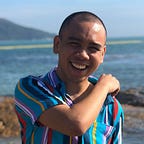In the Philippines, being a bisexual male means something else
Some friends, a few acquaintances, and I were having a late lunch out when this short-haired girl with a fresh face and nice smile walked past the burger joint. I could not not look at her, because she looked like the type willing to dork around and just chill.
A guy friend next to me asked what I was looking at. I told him a chick passed by whom I found interesting. He gave me a high-five.
Lisa, whom I just met, put her burger down. “I thought you weren’t interested in women? Aren’t you bi?”
I told her yes, I’m technically bisexual. “But I call myself gay all the time,” I added.
She then told me I was not gay. She apparently knew friends who called themselves gay, who had hair as long and as straight as katanas and had dresses skimpier than most women. Her gay friends also had make-up all the time.
I ask her, “Do they use the word gay for themselves?” And she nods.
Then my friend, Jace, told me he also worked in a space where people called themselves gay men. Jace was a scrawny dude, and he said he would often feel conscious because the gay guys surrounding him were ripped and burly. Their arms threatened to burst through the seams of their shirts. But these gay men, Jace recalls, spoke beki — an evolutionary language endemic to Filipino queers slowly being adapted by the heterosexual community.
“But aren’t they bi?” another female acquaintance says. “They look like guys.”
Funnily enough, this conversation happens in so many iterations that I already know how to respond without getting ticked off when it arises. What I’m trying to figure out is where the misconception originated.
A 2013 Study from the Pew Research Center said the Philippines is one of the most accepting Asia-Pacific nations when it comes to homosexuality. But sexuality in general in the Philippines remains to be misunderstood, despite attempts to place the discussion mainstream.
See, media depiction of gay men in the Philippines is just like in any other country — you have effeminate gay men usually in pink right next to a woman who is their best friend. They share gossip, beauty tips, and talk about how the woman’s husband is actually cheating on her.
It was not until past 2010 that mainstream Philippine media caught up also adapted to evolving portrayals of gay males — with TV series such as My Husband’s Lover and Til I Met You, as well as films such as In My Life and The Third Party. In these depictions, we come across what most call the paminta, which is Filipino gay slang for “a masculine acting male.” Producers may have sensed that there’s a larger demographic of gay men out there, the ones who have yet to shed their skin. The ones who call themselves discreet.
And the people who belong to this part of gay sexuality have also referred to themselves as bisexual. Back when I was using a dating app in 2012, I would always ask those who have indicated “bisexual” on their profiles how women fare against men when it came to partnering up. A huge majority of them tell me they have never tried sleeping with women, and a large part of that chunk tell me why I would even ask such a question because they would never want to try.
So I ask, “Why do you call yourselves bi then?” After that, it was either I got blocked, or they never replied to me again.
Personally, I call myself gay because I’m mostly attracted to men. I have had romantic and sexual relationships with men, mostly. But I could not hide that part of me which stirs when a good-looking woman passes by. There are even days when the object of my distraction is trans, or queer.
I just find people smokin’. Mostly guys.
But whenever I tell my relatives, my friends, and my workmates that I’m gay, they tell me I’m not. The reasoning goes something like, “You’re not really gay. You don’t act like a girl, and you’re not the girl in your relationship.” (Reading this now, the comment is so misogynistic that I won’t tolerate it anymore.)
I ask back: “Are your heads on crack?”
And the moment of discovery that a sliver of me is attracted to women makes them scream in delight. “There’s hope!” they sing in a psalm, and I could only facepalm myself.
So should I keep on identifying as a gay man, or does this contribute to the erasure of bisexuality? But if I do call myself bisexual, I run the risk of being branded as “oftentimes straight.”
It doesn’t matter eventually, because who I’m sleeping with was never their business to begin with. It will never make sense to compartmentalize your attraction to people for the sake of being understood, because you deal with your desires alone.
The Philippines, although accepting of homosexuality, continues to fail that sexuality exists as a spectrum. Just because you are one thing, it does not mean you are not the other. Acepting something does not mean understanding it.
It is time, however, to deepen the discourse.
The assumption that just because I don’t act like a woman means that I’m not gay happens all around the world. But for someone to tell me that I am not my sexuality because I do not ascribe to norms surrounding that sexuality is screwed up.
Their bodies are not the ones getting familiar wih the flesh and bones of other people. It is not their goosebumps, it is not their heart racing, and it is neither their kisses nor their orgasms. It is ours.
